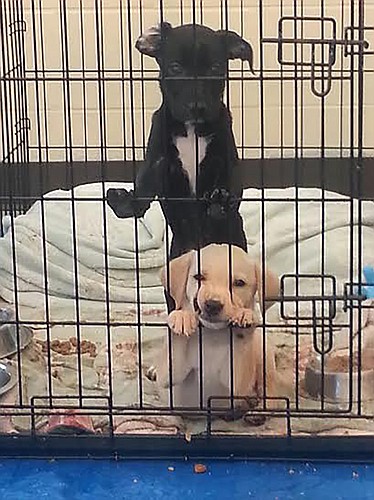- April 18, 2024
-
-
Loading

Loading

A week ago last Monday, Amy Carotenuto director of Flagler Humane Society, started her week sitting on a blue tarp stretched across the floor of the humane society’s education room. A white towel was draped over her legs, with a small black and white Labrador, Xena, on her lap. An IV bag provided much needed fluid and nourishment to the ailing dog.
Xena, one of the first two dogs diagnosed with the Parvovirus, would be the only dog Carotenuto, director of the Flagler Humane Society, would come into contact with on that day. This was one of many precautions implemented to ensure the other animals in the shelter were not exposed.
Ten-week-old Xena, quarantined alone in a room, so far from the kennels you couldn’t hear the other dogs barking as their breakfast was served, was one of the 25 dogs surrendered by Ruth Rupprecht of Saffari Rescue on July 12. The Flagler County Sheriff’s Office served a warrant to inspect the property after receiving an anonymous complaint about the facility. No charges were filed.
The pup on Carotenuto’s lap was one of two dogs diagnosed with Parvo less than two days after they were taken to the humane society. One pup died, and while Carotenuto said they weren’t out of the woods with Xena, the signs were encouraging.
During the past week, 11 additional puppies showed symptoms, and five more succumbed to the disease, but that’s not what Carotenuto and her staff are focusing on.
“The seven (surviving) of the 13 puppies that were quarantined are all eating as of Sunday night,” she said. "It feels like we are out of the woods. Staff was coming in at night, so they’ve pretty much been receiving round-the-clock care.”
The five adult dogs brought to the shelter were put into adoption, and one, a cattle dog has been adopted. The other litter of seven puppies, which were not in quarantine, is being kept away from the general population as a precaution.
The first thing the shelter staff did when the 25 dogs (20 puppies and five adults) and nine cats were brought to the shelter from Saffari, was to administer vaccinations.
“Every dog and cat that comes in here is vaccinated upon arrival, unless we can prove for a fact they have been vaccinated,” Carotenuto said. “Anytime you add a new animal to your home, even if you are just babysitting it, you want to make sure it’s vaccinated and your pets are vaccinated.”
Once the staff feels the 14 puppies are ready, they will be spayed or neutered and placed up for adoption. The nine cats were healthy and are available for new homes.
The canine parvovirus (CPV) infection is a highly contagious viral illness that affects dogs. The virus manifests itself in two different forms. The more common form is the intestinal form, which is characterized by vomiting, diarrhea, weight loss, and lack of appetite (anorexia). The less common form is the cardiac form, which attacks the heart muscles of very young puppies, often leading to death. The majority of cases are seen in puppies that are between six weeks and six months old. The incidence of canine parvovirus infections has been reduced radically by early vaccination in young puppies.
PetMD.com
How to help
The Flagler Humane Society is a 501© 3 nonprofit. Financial donations to help offset the cost of the Parvo treatment are appreciated.